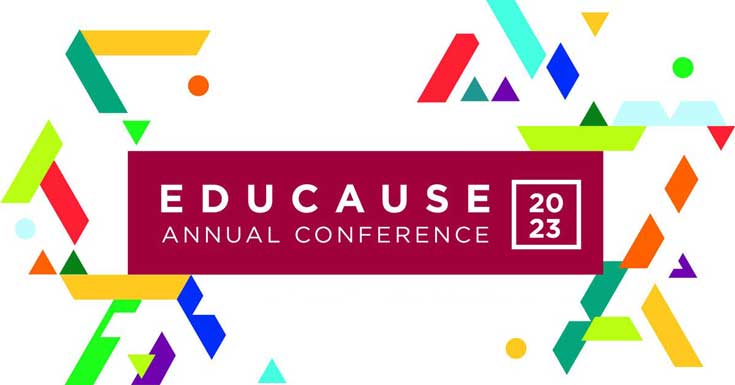Educause 2023 Takeaways Part I: Generative AI & More Importantly, Everything Else
Principal Analyst
Senior Analyst

Educause’s annual conference in Chicago attracted more than 7,000 attendees and 300 vendors from far and wide across the country and globe. Given the vast spectrum of higher education leaders presenting on a broad array of topics, trying to succinctly summarize the breadth and depth of noteworthy issues covered at an event of this scope is a bit like trying to boil the ocean.
There were, however, two recurring themes in the dozens of panel sessions and conversations our team had with institutional technology leaders and vendors:
- The urgent need to move forward on much-needed modernization projects amid tight budget constraints and IT talent shortages.
- All things related to Generative AI.
With both topics we were reminded of how much times have both changed and remained the same in higher education technology since last year’s Educause conference—here’s how:
Financial Constraints
The Same: It’s hard to recall any time in the past when budget cutbacks and economic uncertainty haven’t been two of the most formidable hurdles institutions face in moving forward on large-scale modernization projects.
The Changed: There is stronger downward pressure on institutional bottom lines this year than the previous one because the temporary boost from CARES funding that helped buffer many institutions through unexpected pandemic budgetary havoc has subsided. Furthermore, total undergraduate enrollments still remain significantly below pre-pandemic levels with fewer reasons to expect a rebound anytime soon as the enrollment cliff looms.
In response, institutional technology leaders are:
- Exploring alternatives to wholesale replacement of major administrative systems, particularly with regards to student systems. The interest in finding more affordable one-off SaaS solutions to help tackle a specific need has only grown in the past year, assuming those tools are easily integrated into existing platforms.
- Increasingly aware of the importance of taking sufficient time to prepare before beginning the selection process for major administrative systems. Sessions on IT communications, change management, and best practices for staffing modernization projects were numerous and packed with conference attendees.
Prioritizing Modernization
The Same: Moving from aging technology platforms to cloud-based ones has long been a priority for higher education institutions—80 percent of them have not yet invested in a SaaS-architected finance and HCM solutions, and 84 percent have not selected a SaaS-architected student solution either.
The Changed: In our conversations with institutions and at the sessions we attended, there is an intensified urgency to modernize because of IT talent shortages. While IT hiring challenges have long been an albatross slowing down the pace of progress for many a modernization project, the skills shortage is more of a driver to move forward on these projects now than ever before.
Institutions are thinking long-term and recognize that one major advantage of modern systems is they don’t require programming experience and other technical skills to run.
For the many institutional IT teams contending with high turnover and vacancy rates, going to the cloud is an opportunity to hire new people with the business analyst skill set instead of trying to replace database administrators for systems that are rapidly approaching their end of life anyway.
Generative AI
The Same: AI features and functionality have been embedded in popular higher education technology tools and platforms for years.
The Changed: This was the first Educause annual conference since the mass public adoption of free Generative AI tools like ChatGPT. As one observer noted, about one in eight of the regular Educause conference sessions focused on AI, compared to zero AI-focused sessions the previous year.
In her opening fireside chat on the first day of the conference, renowned cultural critic Dr. Tressie McMillan Cottom noted, “I guess we’re all going to have to talk about AI.” And instead of including AI as one of Educause’s Top 10 issues, Educause’s expert panel deemed it a “bonus topic” in addition to the Top 10.
In many ways, Generative AI is still largely a bonus topic for institutional technology leaders—while it has captured the curiosity of nearly everyone, the Educause crowd is more focused on modernizing its tech stack while surmounting all the challenges that accompany the current imperative of “doing more with less.”
There was, however, a lot of interest and engagement around the topic of AI. With more questions than answers about how Natural Language Processing (NLP) technology can and should be applied, there is a consensus emerging in higher education about the following:
- It’s early days: We are at the height of the hype about Generative AI, but also at the bottom of a very deep ocean of understanding how it will evolve and should be regulated. Despite all the examples and use cases already released, we’ve barely scratched the surface of understanding how to best leverage it to meet higher education’s most urgent priorities. In other words, we are still in demo mode.
- Ethical issues and implications are top of mind: Institutional technology leaders are quite conscious of higher education’s role and obligation in both developing and adopting Generative AI in ethical and responsible ways. Issues raised in sessions included the compounded adverse impact biased data sets can have when applied to generative AI tools, the potential loss of jobs, and environmental sustainability because of the massive computing power these tools require.
The overall vibe at Educause regarding generative AI is best summarized as “curious yet cautious,” which is appropriate given that there are far more questions than answers about the future implications of applying NLP technology on a much broader scale in higher education.
For more takeaways from Educause, look for our Part II blog next week including our own Top 10 list of conference insights aligned with each of Tambellini Group’s 10 Future Campus Framework workspaces.
You Might Also Like:
Categories
Share Article:

Additional Authors:

Other Posts From this Author:
© Copyright 2025, The Tambellini Group. All Rights Reserved.